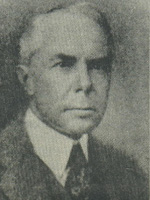
One of G. K. Chesterton‘s most popular contemporaries in the mystery fiction field was Melville Davisson Post, whose main character, Uncle Abner, is as well-drawn and -rounded as Chesterton’s Father Brown (which is saying a lot).
In his article designating Post as "America’s Greatest Mystery Writer", First Things editor Joseph Bottum says that Post and Uncle Abner have suffered undue neglect. This neglect is particularly unjust, Bottum says, because not only are the mysteries of high quality but also the author’s prose is comparable to the best in the field of the clerical mystery:
And yet, high as Post’s tales rank in general mystery fiction, they stand at the very top of the subgenre of religious mysteries. In the deliberate tone of the stories and the matching of the writing’s pitch to its subject, in the uniting of the religious element with the detective’s action and the sense of good’s battle against evil in the solution of a crime, only G. K. Chesterton’s Father Brown belongs beside Melville Davisson Post’s Uncle Abner.
Post wrote twenty-two stories between 1911 and 1928 featuring Uncle Abner, a man for whom the word Justice should always be capitalized simply because he could envision no higher good in this world. In one story, Post describes Abner as follows:
He was one of those austere, deeply religious men who might have followed Cromwell, with a big iron frame, a grizzled beard and features forged out by a smith. His god was the god of the Tishbite, who numbered his followers by the companies who drew the sword. . . . The land had need of men like Abner. The government of Virginia was over the Alleghenies, and this great, fertile cattle country, hemmed in by the far-off mountains like a wall of the world, had its own peace to keep. And it was these iron men who kept it. The fathers had got this land in grants from the King of England; they had held it against the savage and finally against the King himself. . . . And the sons were like them.
About this passage, Bottum says, "Notice how religious history has merged with political history to flesh out Uncle Abner from American caricature to American archetype, and how the language itself has thickened into an unforced King Jamesian diction that immediately sets an atmosphere for the story that follows."
Bottum expresses dismay that the Uncle Abner stories aren’t currently in print, and wonders why:
Where are America’s publishers? Where, in particular, are America’s religious publishers—especially the evangelical presses that keep so much else in print? You can’t imagine Catholic publishing houses allowing Chesterton’s ‘The Innocence of Father Brown’ to fall out of print, but why the evangelical houses have so far failed to promote Uncle Abner, the stern American Calvinist who is our greatest religious detective, is itself a mystery.
(It’s ironic, by the way, that Post, before he created Uncle Abner, penned stories about a scurrilous lawyer named—wait for it—Mason.)
Like some of the best mystery authors, Post could juxtapose the terrible with the beautiful:
[He] was a hunchback, who sat his great roan as though he were a spider in the saddle. He had been married more than once; but one wife had gone mad, and my Uncle Abner’s drovers had found the other on a summer morning swinging to the limb of a great elm that stood before the door, a bridle-rein knotted around her throat and her bare feet scattering the yellow pollen of the ragweed.
If you don’t come across the Uncle Abner stories in book form, you can find a free e-book edition at Project Gutenberg Australia.
Another of Post’s detective characters was "The Sleuth of St. James Square." A review of his exploits by a professional mystery writer is available here.
The clerical detective subgenre is still very much with us. A very skilled and thoughtful writer named Hal White has recently produced a book of short stories about Reverend Dean who, while not quite as stern as Uncle Abner, is nevertheless wise to the workings of divine justice. White’s Reverend Dean stories are all of the impossible crime variety, and it’s great fun to try to figure out how the crimes were done, while there are interesting social and moral insights to be found in the tales.
You can find a review of Hal’s book here. [Note from SK: I heartily recommend all three of the Post series mentioned here, and the Hal White volume as well. I will write a review of the latter just as soon as time allows.]
—Mike Gray
